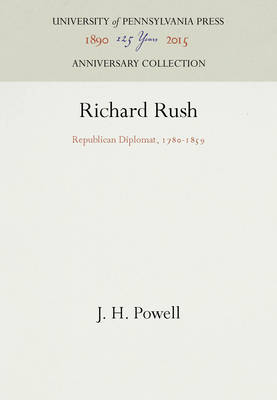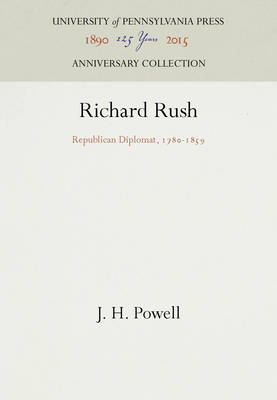
- Retrait gratuit dans votre magasin Club
- 7.000.000 titres dans notre catalogue
- Payer en toute sécurité
- Toujours un magasin près de chez vous
- Retrait gratuit dans votre magasin Club
- 7.000.0000 titres dans notre catalogue
- Payer en toute sécurité
- Toujours un magasin près de chez vous
Description
This volume deals with a man whose life was intimately connected with a most significant formative period in American civilization. Son of the celebrated Dr. Benjamin Rush, Richard Rush was not such a dynamic personality, but in his earnest, gracious way he left almost as deep an imprint on many phases of national life.
Educated as a lawyer, his first public: post was Attorney-General of Pennsylvania. This was followed in 1811 by appointment as Comptroller of the United States Treasury, and in 1814 as Attorney-General of the United States. He was Secretary of State in 1817, consummating the Rush-Bagot Convention demilitarizing the boundary between America and Canada. For eight years, 1817-1825, he was Minister to England, negotiating the Commercial Convention of 1818, conducting the initial conversations which led to the Monroe Doctrine, and working tirelessly for Anglo-American accord. He returned to the United States in 1825 to be Adams' Secretary of the Treasury and unsuccessful candidate for Vice-President in 1828. He was a leading advocate of internal improvements and prominent as an Anti-Mason, but split with his party over the Bank issue. In 1836 Jackson sent him to England to secure the estate of James Smithson, from which grew the Smithsonian Institution. His last office was that of Minister to France in 1847, completing a career of exceptional variety and service, which is described in this biography for the first time. In addition to his official activities, Rush was a prolific writer, chiefly of political pamphlets, but he also edited the first authentic collection of the federal statues and published the two volumes of "Memoranda" of his diplomatic missions. His life necessarily touched many of the great men of his day, and throughout this record of Richard Rush the background and personalities of an important historical period are clearly traced for the reader.Spécifications
Parties prenantes
- Auteur(s) :
- Editeur:
Contenu
- Nombre de pages :
- 296
- Langue:
- Anglais
- Collection :
Caractéristiques
- EAN:
- 9781512805802
- Date de parution :
- 29-01-42
- Format:
- Livre relié
- Format numérique:
- Genaaid
- Dimensions :
- 156 mm x 234 mm
- Poids :
- 603 g

Les avis
Nous publions uniquement les avis qui respectent les conditions requises. Consultez nos conditions pour les avis.






